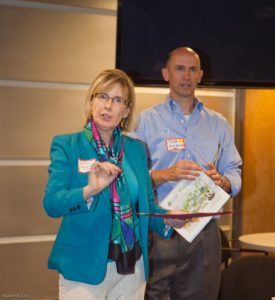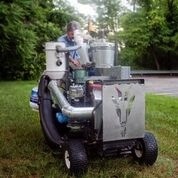By KERRY WORTHINGTON
Ideas ran wild at the co-sponsored Potential Energy DC and Leaders in Energy Petting Zoo on Wednesday, May 27, where 70 attendees saw “energy solutions in their native environments”.

Entrepreneurs, their supporters, funders, and other industry leaders were connected to the DC energy start-up scene as a wide range of startups provided demonstrations to attendees. The night provided exposure for the startups and gave industry leaders a peak at current and upcoming energy solutions.
Dave McCarthy welcomed the attendees to the PEDC co-location offices at TeqCorner that opened in February and set the stage for what to expect from the variety of demonstrations. Of course, he thanked the sponsors for the evening: New Dominion Angels, Deloitte, and Fairfax County Economic Development Authority. Dave founded and owns PEDC which is a startup incubator with a network of entrepreneurs, business mentors, funders, and other key experts. Six members in good standing demonstrated their work on May 27.
Co-host Janine Finnell, founder of the LERCPA group, then welcomed guests and explained that LERCPA and PEDC have many things in common, but mostly that the groups help people to connect with one another to find new opportunities be it jobs, business partnering arrangements, research interests and much more. LERCPA is all about strategic connections, helping to collectively pursue industry interests, and overcome challenges facing our industry as it interacts with jobs, the environment and the economy. The group has over 1,500 Linked In members and welcomes attendees to future events.
Before the evening began, ten businesses set up their demonstrations in three different parts of the building that played up to their use. Starting off outside on the second floor, Yuck Old Paint and Iron Goat were ready for the attendees. Yuck Old Paint really embodies “reuse and recycle” as the first and only business in the mid-Atlantic region to facilitate recycling old paint. Yuck Old Paint works with a variety of clients including realtors, moving companies, large facilities such as hospitals and hotels, and other property managers. The salvageable paint is mostly shipped to Africa for humanitarian construction projects, but some is adopted by local theater groups. Hazardous paint is combined with organic properties until it is safe for landfills, which takes days to weeks for the process to complete.

Also outside was the infamous Iron Goat; mowing away, processing freshly cut grass into edible pellets ready to be fed to livestock. The goat will be ideal for farms with grass, hay or grassy neighbors. An attendee nearby asked about its biofuel potential. Under specific conditions, the pellets could be used as biofuel; however, the pellets are too moist with the demonstrated conditions. Additionally, the demand in the U.S. is greater for livestock at this time while abroad, the demand is higher for biofuels. The goat demonstrated is the only prototype in operation.

Inside on the first floor there were two exhibits. The exyBox “gives your HVDC system a voice.” The box currently uses the High Charts Platform to deliver on demand information for midsize HVDC systems. The information includes statistics on things such as the sub-converter, chiller run time, condenser, and if parts are approaching the need to be replaced. Not only does the box and software system provide information for a range of users (operating officers to building engineers), but the box will match your location with local service providers, communicate with them on the location and services needs to decrease repair time/cost. exyBox has successfully taken the cost of a box from $35,000 per box to $40-100 per month per box.
Across the room, Athena Power was demonstrating their technology: a detecting device for medium voltage lines that will help distribution utilities detect and locate potential system trips due to too many amps on the line at the transformer box and outage information. The purpose of the device is to decrease trips and increase distribution system awareness. Athena currently has five devices sold to a local distribution utility with two devices on the system. The device syncs with the distribution system and will take the guess work out of the process to bring customers online sooner.
We are getting closer to pizza time and I have six stations left!
The next technology, iRestore from Business Radar, also works with the distribution system, but on the reliability and emergency management side of the coin. Currently, a high percentage of outages occur on the distribution system and distribution utilities sometimes have a difficult process for identifying the source, location, and reason for an outage. The iRestore app connects emergency responders with utilities call centers to provide well-rounded report on the GPS location, description of the damage using pictorial category selection, and pictures/video. On the utilities side, they are able to assess what the damage is with increased clarity in order to provide cost and time estimates.
PEARL Home Certification is the only certification system that can provide a Home Performance with ENERGY STAR Certificate. Improving home energy efficiency has been linked to an increase in property value. PEARL has developed a scoring and certificate system to both certify home improvement contractors and homes. A PEARL home certification comes with easy-to-use software to track benefits of energy efficiency. My lingering question is if it does or will have the ability to communicate with the local utility to provide more accurate data on energy efficiency, distributed generation, and demand response, and how it deals with data privacy.
EcoCell Energy is an energy storage solution that powers small devices. The 1 kw LED battery charges in three hours and on average lasts three to five days and can be charged from the grid or a diesel generator. The ideal market is small business owners, such as barbers and tailors, and after a year and a half of development, the battery has been test in Sierra Leone and will be in Nigeria next month. The entrepreneur hopes that by providing energy solutions to small businesses, the economy will flourish.
Another battery solution, Tumalow, aims at driving down energy costs for facilities. The battery charges during non-peak times and comes online during peak use times to flatten out your energy costs. The software, like the Exybox, provides on demand information about energy use and efficiency to building managers. The battery can also be paired with solar. Tumalow is currently being funded by the Sun Shot program at the U.S. Department of Energy.
Speaking of solar, You Save With Solar connects potential solar customers with solar installers in the area. A new website will be rolling out in September that asks searchers a handful of questions like the type of customer, the type of roof and the cost of the electric bill. The purpose is to provide solar seekers with trusted information about solar providers.
This last one is a true connector coming out of the PEDC offices itself. Grant-o-Sphere
compiles non-dilutive grant and other funding opportunities for early state energy solutions. The data base has information on the funder, the requirements, and other key information.
Before the end of the night, not only did I grab a slice of pizza, I was able to connect a couple of like-minded entrepreneurs with each other and do some personal networking myself. All attendees I spoke with were impressed with the depth and breadth of the DC energy solution start-up scene and many were interested in knowing where these companies will be not only in the next few months, but in the next few years.


Leave a Reply